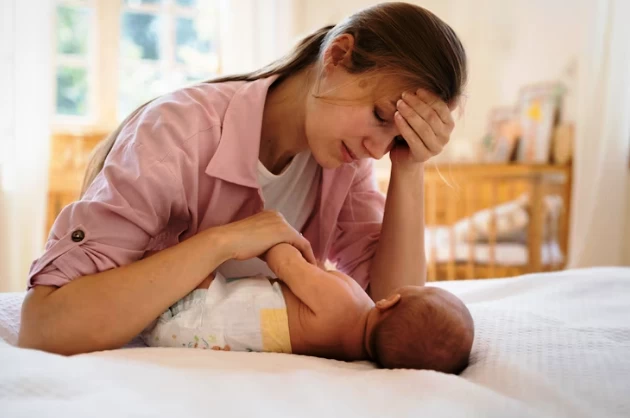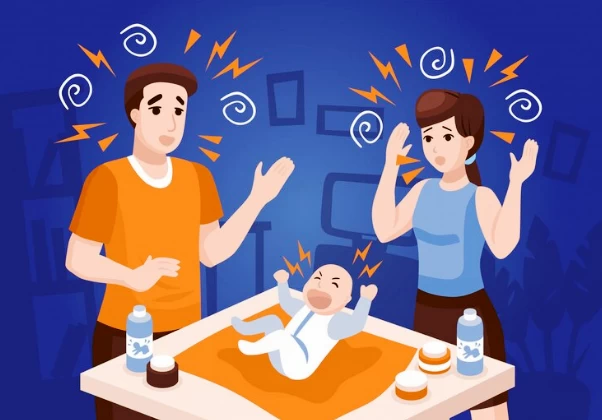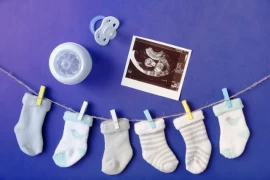
Conditions in Babies That Worry Parents
- Conditions in Babies That Worry Parents
- Common Conditions That Worry Parents but Are Usually Not a Problem
- Newborn Rashes
- Final Remarks
Common Conditions That Worry Parents but Are Usually Not a Problem
After your baby is born, you may encounter certain conditions that cause concern for parents but are generally normal for infants.
- Sleep Duration: Newborns can sleep up to 20 hours a day. Parents may worry when their baby keeps their eyes open only while breastfeeding and changing diapers and sleeps a lot. It's normal for a baby to sleep for extended periods as long as they are actively breastfeeding for 15-20 minutes every 3 hours and having their diaper changed regularly. If your baby sleeps for more than 4-5 hours at a stretch, and you can't wake them up, it's advisable to consult a pediatrician.
- Coughing and Sneezing: These are common in newborns and often lead parents to wonder if their baby is catching a cold. In fact, newborns can cough and sneeze up to 10-15 times a day as they use their respiratory system for the first time to clear their noses and remove any food particles that may have entered their throats.
- Spitting Up: Vomiting is one of the most common occurrences in newborns. Babies can start spitting up from the moment they are born. The main factor is the weakness of the muscle that connects the stomach pouch to the esophagus, allowing breast milk to flow back into the mouth. Babies may also spit up while passing gas. However, this kind of vomiting does not hinder a child's weight gain. It's a misconception that babies throw up milk when they've had too much. Nevertheless, if your baby experiences forceful or projectile vomiting, it's advisable to have them evaluated by a pediatrician.
- Hiccuping: Hiccups are common in babies and can occur 5-6 times a day. This is a protective mechanism that allows the diaphragm to work and ensures that the baby receives the necessary oxygen through the lungs. Frequent hiccups are usually not a cause for concern.
- Straining: Babies may strain during bowel movements due to their underdeveloped abdominal muscles, which make it easier for them to push food toward the anus. As their abdominal muscles strengthen with time, this behavior tends to decrease.
- Jaundice: Jaundice results in changes in a baby's skin color. Initially, it can be observed in the whites of the eyes and then spread to the face and body. Bilirubin, a substance produced from the breakdown of red blood cells from the mother, causes jaundice in babies. Normally, bilirubin should be broken down quickly in the liver, but in newborns, it can build up and lead to jaundice due to their immature livers. Most newborns experience mild to moderate physiological jaundice, which can be assessed using a nomogram chart. If your baby is excessively sleepy and difficult to wake up or if the jaundice levels are high, phototherapy, also known as blue light therapy, may be recommended by a pediatrician.
- Vaginal Discharge and Bleeding: These are observed in baby girls and result from hormones passed from the mother. These conditions are typically seen in the first week of life.
- Breast Swelling: This is another condition resulting from maternal hormones passed to the baby. It usually resolves on its own within the first 3 months. It's important not to rub or massage the baby's breasts during bathing, as this can exacerbate the swelling and lead to abscess formation.

Newborn Rashes
Rashes that appear on a newborn's skin are also a common concern for parents. These rashes can be categorized as follows:
- Toxic Erythema: Occurs in 15-40% of newborns within the first 3 days of life. It presents as scattered red maculopapular rashes primarily on the face, trunk, and proximal extremities. These rashes have irregular borders and resemble small, white, pustular lesions similar to insect bites. They typically resolve within 5-7 days and do not require treatment. Applying moisturizer after bathing can help.
- Mongolian Spots: Common blue-black or purple skin markings often found on the back, buttocks, or hips. They generally fade away by the age of 1 and do not require treatment or monitoring.
- Hemangioma: These are vascular birthmarks that can be superficial or raised from the skin. If they obstruct the nose, ear, or eye, and if they are extensive and raised, they may require treatment. Babies with hemangiomas should be monitored by a pediatrician.
- Salmon Patches (Angel's Kiss or Stork Bites): These are superficial vascular birthmarks that often appear on the nape of the neck, eyelids, or between the eyes. When located on the forehead, they are called "angel's kisses," and when on the back of the neck, they are referred to as "stork bites." Most of these patches disappear on their own by 2-3 years of age and do not require treatment.
- Milia: Tiny, white, superficial cysts that typically resolve on their own within 2-4 weeks.
- Epstein's Pearls: Small, fluid-filled cysts found on the roof of the mouth (palate) in some newborns. They typically resolve within 2-4 weeks.
- Baby Acne: Pimples that may resemble adult acne and are usually located on the face. They are transient and resolve with gentle cleansing and moisturizing.
- Neonatal Pustular Melanosis: Pustules or white lesions, 1-3 mm in size, that can appear anywhere on the baby's body. They often burst and can last for 3-6 months. This condition does not require treatment.
Final Remarks
While this article aims to provide reassurance to expectant parents, it's important to note that pediatricians will schedule frequent check-ups during the newborn period to ensure that more serious conditions are not overlooked. Your baby should be seen by a pediatrician on the day of birth, at hospital discharge, at 5 days of age, at 2 weeks, and at 1 month of age.

Make an appointment with Spc. Dr. Serdar Pop who wrote this article or learn more about this article.
Page content is for informational purposes only. Please consult your doctor for diagnosis and treatment.
Branches related to this guide
Ankara Child Health and Diseases Balıkesir Child Health and Diseases Bursa Child Health and Diseases Diyarbakır Child Health and Diseases Gaziantep Child Health and Diseases İstanbul Child Health and Diseases İzmir Child Health and Diseases Kayseri Child Health and Diseases Konya Child Health and Diseases Samsun Child Health and Diseases
Share This Health Guide





